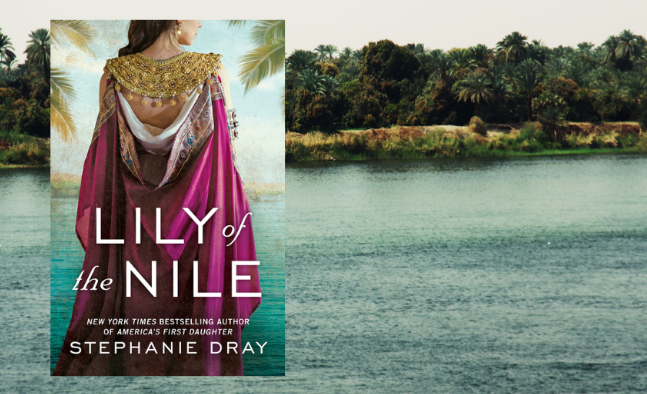Book Review and Giveaway: Lily of the Nile
By Kelly, on January 8th, 2011
About the Book
“With her parents both dead, the daughter of Cleopatra and Mark Antony is left at the mercy of her Roman captors. Heir to one empire and prisoner of another, it falls to Princess Selene to save her brothers and reclaim what’s rightfully hers…”
Lily of the Nile, the debut novel by Stephanie Dray, sweeps you into the glittering and treacherous corridors of ancient power where gods intervene and destinies hang by a thread. Dray takes us beyond the legend of Cleopatra into the coming-of-age of her daughter, Selene. Stripped of title and dignity, Selene must navigate Roman slavery, political intrigue, and divine whispers from Isis herself. When blood-red hieroglyphs mysteriously appear on her skin, she realizes that a hidden force has chosen her to restore a fallen dynasty.
The Story: From Princess to Captive
“Lily of the Nile” follows Cleopatra Selene, daughter of the legendary Egyptian queen and Mark Antony. After her parents’ defeat and suicide, ten-year-old Selene and her twin brother Helios are paraded through Rome as captives in Octavian’s triumph. The novel chronicles her journey from sheltered princess to savvy political player, navigating the treacherous waters of Roman politics while preserving her Egyptian identity.
Dray expertly weaves complex political landscape into her narrative, showing how these royal children became valuable pawns in Octavian’s consolidation of power. The contrast between the Alexandria Selene remembers and the Rome she must adapt to creates a vivid backdrop for her story.
Character Development: Selene’s Transformation
Selene emerges as a remarkably complex protagonist whose evolution anchors the entire narrative. Rather than a passive victim, she’s portrayed as an intelligent young woman who learns to wield influence through strategic thinking and spiritual conviction. Her struggle to maintain Egyptian identity while adapting to Roman expectations creates authentic internal tension.
What makes Selene particularly compelling is her relationship with her brothers and her growing understanding of political dynamics. She evolves from naive princess to strategic thinker while maintaining fierce loyalty to her heritage.
The Magic in History
One of the novel’s most distinctive features is how Dray incorporates magical elements into the historical narrative. Grounded in authentic ancient Egyptian religious practices, Selene’s connection to Isis and her mystical abilities feel organic rather than imposed. The magical aspects serve multiple purposes: connecting Selene to her heritage, providing inner strength, and acknowledging that ancient peoples experienced a world where spiritual and material boundaries were fluid.
Rich Symbolism and Themes
The symbolism throughout “Lily of the Nile” adds remarkable depth. The moon, Selene’s namesake, represents her connection to Isis and her cyclical journey through darkness and light. The Nile symbolizes memory and homeland, contrasting with Rome’s rigid architecture. These symbols work on multiple levels, supporting character development and thematic exploration without becoming heavy-handed.
Most Significant Symbols:
- The Moon – Divine connection and cyclical nature of power
- The Nile – Egyptian heritage and spiritual renewal
- The Lotus – Royal identity and potential for rebirth
- Water – Transformation and flow between worlds
Political Intrigue
Dray masterfully portrays Augustan Rome’s complex political landscape, where survival depends on reading subtle power currents. Octavian emerges as a fascinating antagonist—coldly calculating in his use of people as political instruments. His treatment of the royal children as both honored guests and controlled hostages creates constant tension.
The political intrigue rivals modern dramas, with layers of manipulation and shifting alliances. Selene’s gradual understanding of these dynamics and her development of political acumen provides one of the novel’s most satisfying arcs.
Historical Accuracy
Dray demonstrates impressive historical research, grounding her story in authentic details about daily life, religious practices, and political structures. She clearly distinguishes between documented facts and creative interpretations, particularly in her author’s note. Where she takes creative license—such as in developing Selene’s personality—she does so in service of compelling narrative while remaining true to historical constraints.
Comparative Literature
Among novels about Cleopatra’s children, “Lily of the Nile” stands out for its unique blend of historical accuracy and magical realism. While Michelle Moran’s “Cleopatra’s Daughter” covers similar ground, Dray’s approach offers deeper spiritual elements. What makes her treatment distinctive is the emphasis on Egyptian perspective within the Roman world, providing fresh insights into familiar events.
My Verdict
“Lily of the Nile” earns 4.5 out of 5 stars for its masterful blend of historical accuracy, compelling character development, and unique mystical elements. The novel succeeds brilliantly at bringing ancient history to life while telling a deeply personal story of identity and survival.
Perfect for readers who enjoy:
- Historical fiction with strong female protagonists
- Ancient Egypt and Rome settings
- Political intrigue with personal stakes
- Mystical elements in historical settings
- Rich discussion material for book clubs
Looking Ahead
As the first book in a trilogy, “Lily of the Nile” sets up compelling questions about Selene’s future that make the subsequent books essential reading. The novel works well standalone while clearly being part of a larger narrative arc following Selene’s entire life story.
Ready to explore ancient Egypt and Rome? “Lily of the Nile” offers a perfect entry point into this fascinating period, blending rigorous historical research with captivating storytelling that will leave you eager for more.





